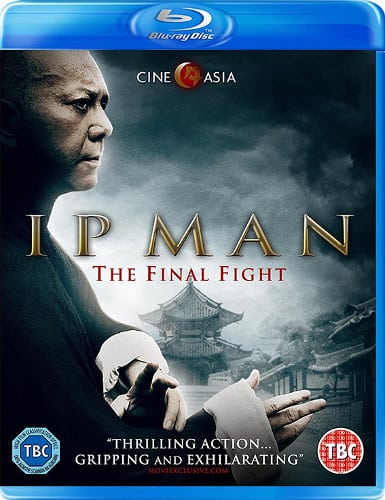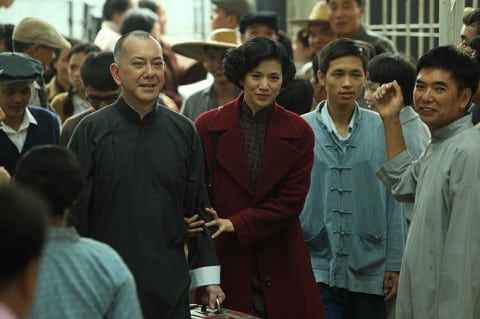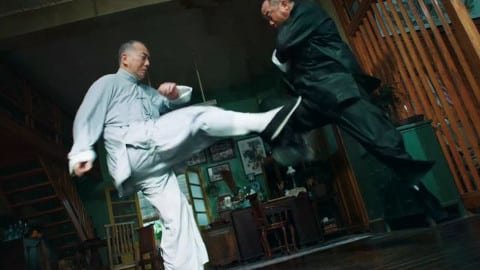Ip Man: The Final Fight (2013)
Directed by: Herman Yau
Written by: Erica Lee
Starring: Anthony Chau-Sang Wong, Eric Tsang, Gillian Chung, Jordan Chan
AKA IP MAN: JUNG GIK YAT JIN
Hong Kong
AVAILABLE ON BLU-RAY AND DVD: 12TH JUNE, from CINE ASIA
RUNNING TIME: 100 mins
REVIEWED BY: Dr Lenera, Official HCF Critic
In 1949, Wing Chun instructor Ip Man, who’s suffering from chronic gastric pain, moves from his home town of Foshan to Hong Kong and begins to teach Wing Chun to some new students on the rooftop of a building which houses a hotel staff’s general association. However, life is hard: Ip struggles to make ends meet, his wife Cheung Wing-sing only stays briefly, industrial action pits some of his students against each other, and he seems to be heading for a conflict with rival master Ng Chung….
The guy who’s best known for teaching Bruce Lee has spawned a virtual mini-industry in recent years, with six movies about the character, one TV series, and another [The Legend Of Bruce Lee] in which he featured considerably. The most popular films seem to be the trilogy starring Donnie Yen, which I’m ashamed to admit I haven’t seen. I have, though, seen Wong Kar Wai’s slightly messy but undeniably artistic The Grandmaster – or rather one of the several edits of it. I’m assuming that Ip Man: The Final Fight is a sort of sequel or at least a kind of follow-up to the same director Herman Yau’s 2010 effort The Legend Is Born – Ip Man, though having not seen that film either I found this one easy to follow, so I wouldn’t say that viewings of any of the other films are necessary to understand and enjoy this one – and there is indeed a great deal to enjoy in it. In fact, while I don’t think it’s quite as good a film overall critically speaking, I may havee found it to be a more enjoyable watch than the Wong Kar Wai picture which had some stunning scenes and imagery in it and loads of that beautiful melancholy typical of that director but which was also very disjointed [well, at least in the version I saw]. The Final Fight also has some problems with regards to its storytelling, most of which can be boiled down to trying to tell a story in 100 minutes which deserves a far greater running time, but it’s a smoother piece for the most part.
Now if you’re expecting an action packed fight fest than you may be a bit disappointed with The Final Fight, which covers most of Ip Man’s later years, though beginning as it does at the point from when Ip begun to make his name, there is probably a case to be made for this being the most authentic of the Ip films so far, though I’m sure that some aspects have still been fictionalised. The fight scenes though will really please those who, like myself, are tiring of all this jumping and floating around you still tend to often get in historical-based martial arts movies from Hong Kong and China. Not that I’m against it mind you – I just think that it belongs far more in fantasy-based flicks than ones which are trying to be realistic. While not numerous in number, the brawls in this film are fairly un-flashy but martial arts buffs will be treated to some of the best and most authentic displays of Wing Chun on film seen in quite a while, the movie virtually becoming a showcase for the style. The filming is just right too, the camera content to keep back and let us see the moves properly without that excessive close-up/fast edit/shakycam malarkey while still cutting enough to keep things pacy. And Yau can’t resist having a cheeky jab at ‘wire-fu’ when somebody reads an exaggerated newspaper report of a fight Ip Man was in the night before and we see the man leaping all over the place, a scene which also illustrates very well the creation of a legend before our eyes.
Bruce Lee is clearly referred to in the opening scene of Ip Man’s son Ip Chun [who was an advisor on the set and who has a cameo in the film] telling his father that his pupil is on TV and asking him if he contacted him. Lee will actually appear at the end of the movie, though not seen face on and wearing those sunglasses any Lee double worth his salt seems to be obliged to wear. Some narration from Ip Chung gives us some background and we flash back to Hong Kong in 1951, and here we get a rather breathtaking bit [which looks like it was shot in 3D though the rest of the film tends not to look this way] where we move from a aerial view of Hong Kong down into a street and to where Ip Man has just arrived. Elsewhere the film is full of crane shots which are often well achieved and really provide a sense of scope, though there are probably too many of them, Yau getting a bit carried away! Still, this is a fine looking film throughout, and Hong Kong in the 1950’s and 1960’s is well evoked without getting bogged down in excessive period detail,though bizarrely this film skips the riots and the civil war that occurred during Ip Man’s life time, something which almost comes across as distortion of history.
Ip Man is asked to demonstrate his skill near the beginning, and reluctantly challenges the other guy to try to get him off the newspaper upon which he’s standing, after which they go out and Ip Man is treated to a restuarant’s “speciality: meal on a plate”, something which is beginning to catch on due to the increasing number of immigrants from the West. However, that’s it for at least half an hour in terms of brawling, but the drama is definitely compelling enough. Ip Man starts to train a variety of students, including cop Tang Sing, prison warden Wong Tung, dim sum seller Chan Sei Mui, and activist Lee King. We get to know these people a bit even though the emphasis is on Ip Man and his personal life. When his wife Cheung Wing-sing comes to stay, we have one of the sweetest scenes I’ve seen in a movie in some time when the two are in bed and are trying to share a blanket. “I’m wrinkly”, says Cheung to Ip Man which is surely a deliberate joke considering how much younger she is than him, though not as young as singer Jenny with whom he becomes involves later on, to the objection of his students. Said students are sometimes in conflict with each other, especially during a series of strikes, though there’s romance too. Then there’s White Crane Style master Ng Chan who has a fight with Ip Man behind closed doors, a fight which unusually ends up in respect, a gift and friendship which was really nice to see. However, the rather comic book-like Dragon, a gangster who rules the underworld and who has one of Ip Man’s students under his thumb, also seems to be heading for a conflict with Ip Man, and could prove to be a more dangerous opponent.
It’s quite a downbeat tale we watch, with far more sadness than happiness taking place in Ip Man’s life. At one point Ip Man wonders what the point of being a martial arts master is if he can’t help a friend who is so poor that has to sell one of his children to feed the others [which is actually similar to what happened to Jackie Chan]. The film sometimes throws up important questions about both life and the martial arts and therefore can be quite thought provoking. However, there are too many occasions when a scene is a bit of the way through and then one of the two voiceovers cuts in and finishes said scene. At least one dramatic occurrence occurs off screen – instead, we just hear about it – and this weakens the emotional effect when the subplot in which this event takes place returns near the end. Ip Man is well known for having an opium habit, and I thought that this was going to feature majorly in the film after a scene where Ip Man seems to lose his cool for once when he finds out that he’s been given opium to give him some relief from pain. However, it’s never mentioned again, which makes one wonder why the scene was included in the first place. The Final Fight feels like it’s been heavily cut down from a much longer film, with some voice-over to attempt to smooth over the edits. And I’m not sure that it really needed a villain, except to provide an excuse for a big one-on-one at the end. And yet I was still continually involved with the drama, rather than this being one of those martial arts films where you’re twiddling your thumbs waiting for the next showdown.
Hong Kong cinema veteran and Bunman himself Anthony Wong seems on the surface to be an odd choice for the role of the dignified, humble and peaceful title character. Apparently he was drunk when Yau rang him and he accepted the role, something he then regretted the next morning. However, a strict diet and a crash course in Wing Chun helped to make him look much more the part, and he ends up really suggesting both the outer and inner strength, plus the wisdom, of Ip Man. Lifelong fans of Hong Kong cinema will recognise appearances by Xiong Xin Xin [who can still bust some incredible moves] and comedian Eric Tsang [very good in a serious part], plus several familiar newer faces. While there is action [I haven’t yet mentioned the lion dance that turns into a full-on fight], this particular Ip Man film generally goes for a more sombre approach which is fitting considering that Ip Man is older than he’s usually depicted here, and which results in a more emotionally involving experience than you may expect, despite some considerable unevenness in the storytelling.








Be the first to comment